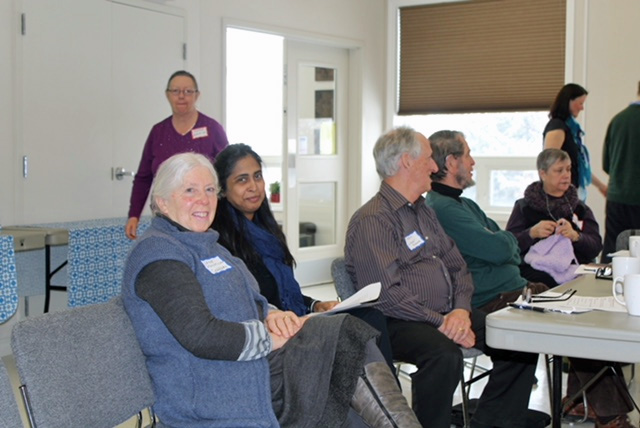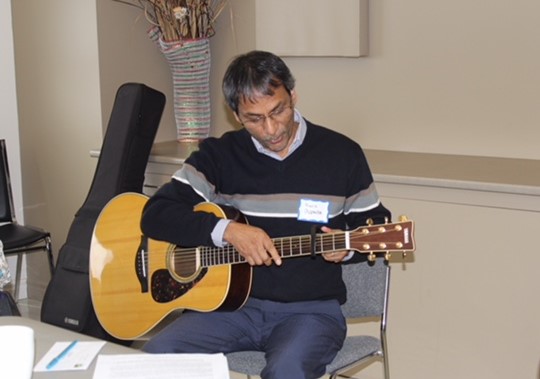Insights gained from this year’s unit conventions
Four questions posed by the National Spiritual Assembly at this year’s unit conventions opened avenues for consultation across the country.
At the beginning of February, friends across the country met in their units to elect the delegates for the National Convention, taking place in May. As each unit reflected on the year past and planned for the year ahead, those gathered delved into the National Spiritual Assembly’s letter sent to each convention and sought answers to the four questions asked of them. Below are some of the insights gained through these consultations.
The numbers of 30,000 participants in the celebrations and 100,000 who were invited represent your lists of friends and family, connections you already have, potential protagonists in the community-building process. A protagonist is a central figure, a leader, a hero. What does this vision imply? In what practical ways does it affect our actions?
Drawn to the vision the Universal House of Justice put before us of a multitude of potential protagonists from among our friends and loved ones, those of us gathered at the unit convention for Prince Edward Island grappled together with this word “protagonist.” We reflected on the conversation that we are seeing evolve in our community: moving from a tendency to invite to events, to seeking collaborators in a process. We noted examples of our friends who had already stepped up to work alongside us to bring about the participation of so many others in the events surrounding the Bicentenary of Bahá’u’lláh’s birth.
The convention fell in the middle of our teaching project, where we were inviting youth to come to a youth gathering. One participant observed that, during the project, his conversations with potential participants were most effective when he shared all the necessary information for them to make an educated decision about their attendance. We contemplated this truth: that one can only arise as a protagonist if one has access to knowledge, namely, to the profound concepts enshrined in the Revelation and to the Word of God itself. The consultation felt very much rooted in a process in motion, and in our shared understanding of the collective capacity we have built as a community in this bicentennial year. As we read of island nations in which significant portions of the population are participating, it was exhilarating for us to consider that our island province could be next on the horizon.
– Jasmine Michel in Charlottetown, P.E.I.
A large proportion of those who celebrated the Glory of God were Canada’s youth, of every background. What is needed to support the widening circle of young ones who long to arise to serve?
The word “fortitude” rang throughout. We were struck by how it may look and what that meant in our thoughts and actions. Many individuals spoke about the need to help the younger generation by providing them with space to think about how meaningful their lives are and how they can be assisted to contribute towards a transformation in society.
One person shared that if there is anything for youth, then they would be happy to help by providing the food. Another person shared that they would like to see us all, the adults, stepping up and having conversations with them. As an adult, I always feel shy about having conversations with youth and I struggle to have engaging conversations with them, but I think if we just try, and we’re sincere about it, then a natural friendship will emerge. I feel hopeful that a conversation like this came out of our unit convention.
– Carmen Ighani Kianfar in Toronto, Ont.
Among the capacities that have developed in the community are the ability to act with intensity and purpose; to work together in groups, plan and organize; to invite and welcome friends and strangers alike; to teach directly, confidently and systematically. How will these capacities be channeled to continue expanding in each of the seven cycles that remain until the bicentenary of the Birth of the Báb?
We found that the experience of planning and celebrating the bicentenary of the Birth of Bahá’u’lláh gave us needed preparation for the future. The friends recognized the need to intensify efforts in the next seven cycles leading up to the next bicentenary celebration. It was noted that we should use the insights and skills gained from organizing the bicentenary events to organize future Holy Days as well.
One cluster shared how a friend of the Faith who attended the Bicentenary celebration is now offering her home to host Bahá’í gatherings. This is being pursued, starting with Ayyám-i-Há. The friends felt that an important aspect of growth and community development is to foster such relationships, and that the training institute courses are central to all our efforts.
It was an opportunity for the friends to share their experiences and learning about the community building activities, especially the junior youth spiritual empowerment programmes underway in most clusters.
– A group of friends from the unit convention in Carleton Place, Ont.
The human resources and material means required for this next stage will be substantial, and are linked. “The act of contributing to the Fund, then, is imbued with profound meaning: it is a practical way of hastening the advent of that civilization, and a necessary one, for as Bahá’u’lláh Himself has explained, ‘He Who is the Eternal Truth—exalted be His glory—hath made the fulfilment of every undertaking on earth dependent on material means.’”[1] What is needed to nurture a deeper appreciation of the responsibility for all believers “to support the work of the Faith through their own means and, further, to manage their financial affairs in the light of the teachings to contribute to the Funds of the Faith”[2]?
In response to this question on the Fund, a group of friends in Toronto decided to get together to study the March 1, 2017 letter from the Universal House of Justice regarding economics. Through their study they were able to reflect on what it means to live a life where finances are viewed as a means of service rather than a means of personal gain.
At a Feast held soon after the convention, the conversation on the Fund continued. A friend shared that as we become more in tune with the spiritual needs of the community we also become more in tune with the material needs of the community and that these two things are intimately intertwined. He said, “I am not just a spiritual soldier. I have the material means to contribute to the physical reality of the Cause.”
– From friends at the Feast of Mulk in Toronto, Ont.
[1] 29 December 2015, Universal House of Justice to the Conference of the Continental Boards of Counsellors
[2] Ibid.
Category: Community life, Elections










